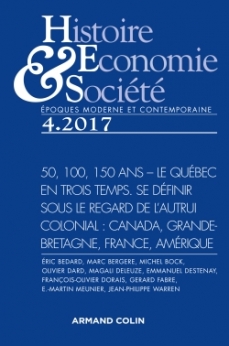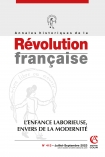
Histoire, Économie & Société (4/2017)
Pour acheter ce numéro, contactez-nous
Recevez les numéros de l'année en cours et accédez à l'intégralité des articles en ligne.
De l’ambivalence du Québec à l’égard des États-Unis, l’économiste Édouard Montpetit (1881-1954) incarne tout au long du premier XXe siècle le pôle positif en se faisant le patient avocat d’un nécessaire consentement à l’attraction américaine. Terrain capital pour lui, l’université québécoise sera d’autant mieux armée qu’elle saura puiser à la fois à la tradition française et à la modernité américaine, tout en maintenant intacte sa personnalité, moyennant une synthèse réussie des éléments étrangers qu’elle assimilera. Séduit dès son séjour à Berkeley en 1918, il mène à la fin des années 1930 une enquête dont il ressort que le modèle américain tend à imprégner les programmes universitaires québécois dans le sens de l’émulation. Nous analyserons la posture éclectique de Montpetit comme le symptôme d’une quête identitaire à l’issue incertaine.
In the first half of the twentieth century, the economist Édouard Montpetit (1881-1954) incarnated the positive pole of the mixed relationship of Quebecers with regard to the U.S. He defended the idea of the attractive power of the U.S., especially for the Quebec university system, which would be capable of keeping up its French-Canadian identity by performing the synthesis of the French tradition and the American modernity. His mission in the University of California, Berkeley in 1918 and his survey about the Quebec university programs at the end of the 1930s convinced Montpetit of the necessity of taking up the best in the U.S. academic model, with the objective of an emulation. Finally, Montpetit’s eclecticism concerning his foreign influences reveals an uncertainty among French Canadians in their quest of identity.

